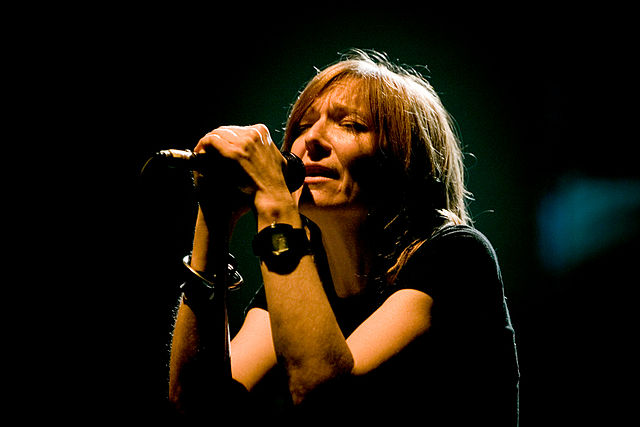As a relatively impatient person, it’s always been hard for me to believe that “good things take time.” But if there’s one group of people who have come close to convincing me, it has been musicians.
Some of my favorite artists have gone through long dry spells in between albums: Kendrick Lamar took five years in between recording “DAMN.” and “Mr. Morale and the Big Steppers.” Tame Impala released “Currents” in 2015, “The Slow Rush” in 2020 and has yet to produce a new album since. Vampire Weekend finally released “Only God Was Above Us” this April after 2019’s “Father of the Bride.”
These artists' gaps in between album releases, however, pale in comparison to the elusive singer-songwriter Beth Gibbons’ highly intermittent output. Gibbons is the lead singer of the English alternative group Portishead, but has not made a record with the band since 2008. Now, Gibbons has released her first solo work since her 2002 album “Out of Season.” It’s safe to say her latest, “Lives Outgrown,” has been worth the wait.
Gibbons was not even 30 years old when Portishead released “Dummy,” one of the most outstanding debut records of all time. It’s been exactly 30 years since its release, quite literally another lifetime for Gibbons. Not surprisingly, the passage of time and aging are key themes of her aptly titled “Lives Outgrown.” She sings: “And the wild has no more to give/ Gone too deep/ Gone too far to rewind/ Too far to rewind.”
In the mid-’90s, Gibbons explored the “wild” life as a young woman penning luscious, sex-stained songs, a cigarette dangling from her hand during the band’s incredible live performances. “For I’ve been a temptress too long,” she once cooed on the song “Glory Box.”
That sense of wildness has been tamed. Now on the brink of 60, Gibbons has turned her attention from the corporeal world to find transcendence. “I’m heading toward a boundary/ That divides us/ Reminds us/ Travelling/ On a voyage where the living/ They have never been/ Have never seen,” Gibbons sings in “Floating on a Moment.”
Gibbons has fully embraced the inevitability of death in her new music, recently saying: “It has been a time of farewells to family, friends and even to who I was before, the lyrics mirroring my anxieties and sleepless nighttime ruminations, hence ‘Lives Outgrown.’ Not just because of the way we travel through emotional or psychological transitions in our lives but relating more to the time we leave this planet and our motion into the unknown.”
Gibbons’ lyrics meditate on her experience with the passage of time, while allowing the listener to look inward and reflect on what time has taken from us as well.
Preparing for death and looking to the afterlife may be a somber theme to build a record around, but Gibbons’ raw feelings make a gripping emotional centerpiece for the album. Her poetic chops also allow her to avoid trite lyricism about the reality of death.
It also happens to be instrumentally beautiful. The album’s closing track, “Whispering Love,” is a perfect blend of flute-driven ballad paired with lush, melodic instrumentals—a song that seems made for walking contemplatively in a meadow.
Contrastingly, Portishead’s songs are shrouded in a hazy mist of trip-hop, evoking a mix between a swanky James Bond-like soundtrack and the croons of a mysterious lounge singer. But Gibbons’ new album rips itself open, leaving few sonic barriers between her and the listener.
Although the sound may be different, Gibbons holds onto some of Portishead’s lyrical subjects and deals with themes of the aging body.
Gibbons may have once labeled herself as a “slave of sensation,” but she’s come to grips with her body not being what it once was; “Cause every time’s taken, I’ll never say/ Foolеd ovulation, but no babe in me/ And my heart was tirеd and worn,” she sings on the track “Oceans.”
Gibbons is open about her struggles with menopause and infertility in this deeply personal sharing with thousands of listeners; this straightforward vulnerability makes each track an intimate listening experience.
But growing old isn't a sudden driving force for Gibbons to reflect on time gone by; these themes have seemed to gnaw at her for years now.
“Time rolls/ As days go by/ And now I've figured/ That I ain't gonna last/ Summer skies/ Are leaving me behind,” she sings on her 2002 record. The feeling of time passing you by in your 30s versus your 60s must be very different, but the nostalgia Gibbons longs for on “Lives Outgrown” seems to have been a part of her for a long while now.
Disillusionment with the music industry itself also appears on the album, as Gibbons is famously reclusive, seldomly ever doing promotional work and keeping herself largely out of the public eye.
“The charms of illusion, they cut like a smile/ Erosion of reason, a path paved to buy/ ‘Cause the dreams are for sale from afar,” Gibbons condemns in “For Sale.”
But through all of these grapplings, Gibbons still maintains, like so many great artists do, that love is perhaps the one thing that we’ll be able to take with us when we pass on from this world into the next one.
“Don't need no other like I need you always/(I need you always),” she sings on “Reaching Out.”
Gibbons is not an artist who uses a word like “always” lightly, and as she braces herself for growing even older, she expresses the need for sincere companionship that has been missing for so much of her life.
Gibbons is singular in many ways, pushing back against the music industry, rejecting the institution of marriage and collaborating with artists in various genres. “Lives Outgrown” is a singular contemplation of the countless changes we experience throughout our lives and the ultimate change to come after we pass away.








